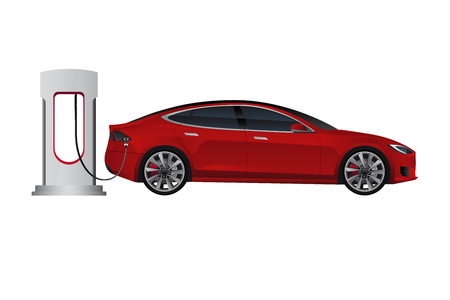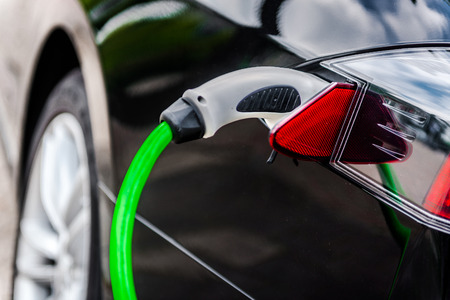1. Introduction
The world of luxury cars is evolving, with electric vehicles (EVs) now competing directly against traditional gasoline-powered models. As more premium automakers introduce high-performance electric alternatives, drivers are left wondering which option offers the best overall experience.
Luxury cars are about more than just speed—they offer a blend of comfort, advanced technology, and smooth handling. Both electric and gasoline-powered vehicles bring unique strengths to the table, making the choice between them more exciting than ever.
The Growing Competition
Luxury brands like Tesla, Porsche, Mercedes-Benz, and BMW are investing heavily in EV technology, while brands like Ferrari and Lamborghini continue to refine their gasoline engines. The competition between these two powertrains is heating up, offering buyers a wide range of options tailored to their driving preferences.
Key Factors in a Premium Driving Experience
When comparing electric and gasoline-powered luxury cars, several key factors define the driving experience:
| Factor | Electric Vehicles (EVs) | Gasoline Vehicles |
|---|---|---|
| Performance | Instant torque, smooth acceleration | High-revving engines, traditional power delivery |
| Sound | Nearly silent operation | Roaring engine sound |
| Technology | Advanced AI, innovative features | Refined mechanical engineering |
| Convenience | Fast charging networks expanding | Quick refueling at gas stations |
| Environmental Impact | Zero emissions, sustainable materials | Higher emissions, reliance on fossil fuels |
Both vehicle types have their advantages, and the best choice ultimately comes down to personal preference. In the next sections, well dive deeper into these factors to see how they shape the luxury car experience.
2. Performance and Driving Dynamics
When it comes to performance and driving dynamics, electric and gasoline luxury cars each offer unique advantages. From acceleration to handling, torque delivery, and overall driving feel, both powertrains create distinct experiences behind the wheel.
Acceleration and Speed
Electric luxury cars have an edge in acceleration due to their instant torque delivery. Unlike gasoline engines that require revving up to reach peak power, EVs provide immediate power the moment you press the accelerator. This results in a smoother and quicker launch.
| Feature | Electric Luxury Car | Gasoline Luxury Car |
|---|---|---|
| 0-60 mph Time | Often under 4 seconds | Varies, typically 4-6 seconds for high-performance models |
| Power Delivery | Instant torque for rapid acceleration | Builds power progressively with RPM |
Handling and Stability
Handling performance differs between the two. Electric vehicles (EVs) often have a lower center of gravity due to battery placement, which helps with stability and cornering. Gasoline cars, particularly performance-focused models, often come with finely tuned suspension systems for precise steering and road feedback.
Torque Delivery and Driving Feel
One of the biggest differences in driving feel comes from torque delivery. EVs provide a linear power band with no need for transmission shifts, while gasoline engines rely on gears to distribute power. Some drivers prefer the seamless thrust of an EV, while others enjoy the sensation of shifting gears and the engine’s responsiveness.
| Aspect | Electric Luxury Car | Gasoline Luxury Car |
|---|---|---|
| Torque Response | Instant and smooth | Dependent on RPM, can have turbo lag |
| Gear Shifts | None, single-speed transmission | Multi-speed transmission enhances engagement |
| Sound and Sensation | Quiet and refined | Engine sounds, mechanical feedback |
Overall Driving Experience
For those who prioritize effortless speed and smoothness, electric luxury cars are an exciting choice. However, if you appreciate the mechanical thrill of engine sounds, gear shifts, and a more traditional driving experience, gasoline luxury vehicles still hold their charm. Ultimately, the best choice depends on what kind of driving feel aligns with your personal preference.

3. Comfort and Cabin Experience
When it comes to luxury vehicles, comfort and the overall cabin experience play a crucial role in defining the driving experience. Both electric and gasoline-powered luxury cars offer premium features, but there are notable differences that can impact how enjoyable the ride feels.
Noise Levels: A Quieter Ride?
One of the biggest advantages of electric vehicles (EVs) in terms of comfort is their nearly silent operation. With no internal combustion engine (ICE) producing vibrations and noise, EVs create a much more serene in-cabin atmosphere. Gasoline-powered luxury cars, while equipped with advanced noise-reduction technology, still produce engine and exhaust sounds that might disrupt the cabin’s peacefulness. Some luxury brands even use active noise cancellation or enhanced engine sounds to modify the auditory experience.
Ride Quality: Smooth vs. Powerful
Electric luxury cars often feature advanced suspension systems designed to complement their heavy battery packs, resulting in a smooth and stable ride. Their low center of gravity also improves handling and reduces body roll. Gasoline luxury cars, on the other hand, typically offer adaptive suspension settings that can switch between comfort and sport modes, allowing for a more customizable ride experience.
Advanced Cabin Technologies
Both EVs and gasoline luxury cars come packed with high-tech features, but EVs often have a slight edge due to their newer designs. Here’s a comparison of some common luxury in-cabin technologies:
| Feature | Electric Luxury Cars | Gasoline Luxury Cars |
|---|---|---|
| Infotainment Systems | Large touchscreen displays, AI-driven interfaces, and over-the-air updates | Advanced touchscreens, physical controls, but fewer software updates |
| Climate Control | Efficient electric heating/cooling, zone-based climate systems | Traditional heating/cooling, often with ventilated seats |
| Autonomous Features | Advanced driver-assistance features with frequent software improvements | High-end driver assistance but limited over-the-air updates |
| Noise Cancellation | Almost silent cabin with additional soundproofing | Engine and exhaust noises mitigated by advanced insulation |
Interior Materials and Design
Luxury car brands take great care in crafting premium interiors, using high-quality materials such as leather, wood, and metal. Electric luxury cars sometimes experiment with sustainable materials, including recycled fabrics and vegan leather, to align with their eco-friendly appeal. Gasoline luxury cars, meanwhile, continue to offer traditional luxury finishes that emphasize craftsmanship.
Final Thought on Cabin Experience
While both types of vehicles provide exceptional comfort, EVs tend to offer a quieter, more tech-forward cabin, while gasoline luxury cars balance classic luxury with familiar refined features. Ultimately, the choice depends on whether you prioritize cutting-edge technology and silence or the traditional feel of a powerful, well-insulated engine.
4. Convenience and Ownership Experience
Charging vs. Refueling
One of the biggest differences between electric and gasoline luxury cars is how you power them. Gasoline cars have the advantage of quick refueling—just stop at a gas station, fill up in a few minutes, and youre back on the road. On the other hand, electric cars require charging, which can take anywhere from 30 minutes at a fast-charging station to several hours with a home charger.
Here’s a quick comparison:
| Factor | Electric Cars | Gasoline Cars |
|---|---|---|
| Time to Refuel/Charge | 30 minutes to several hours | 5-10 minutes |
| Availability of Stations | Expanding, but not as common as gas stations | Widespread and easy to find |
| Convenience | Charge at home, but public charging may require planning | Quick refueling at almost any gas station |
Maintenance Requirements
Luxury electric cars require less maintenance compared to their gasoline counterparts. With fewer moving parts, no oil changes, and a simpler drivetrain, electric cars generally have lower maintenance needs. However, battery replacement costs can be significant down the road. Gasoline cars, while having routine oil changes and more mechanical components to service, have established maintenance networks that make repairs easy and predictable.
Common Maintenance Needs
- Electric Cars: Battery performance checks, tire rotations, brake fluid changes (less frequent due to regenerative braking).
- Gasoline Cars: Oil changes, engine tune-ups, brake pad replacements, transmission fluid changes.
Long-Term Ownership Costs
Electric luxury cars often have lower operating costs since electricity is generally cheaper than gasoline, and maintenance needs are reduced. Additionally, EV owners may benefit from tax incentives and reduced registration fees in some states. However, battery replacements (usually after 8-10 years) can be expensive.
For gasoline luxury cars, fuel costs fluctuate based on gas prices, but they typically have a longer track record of reliability and resale value retention.
Comparing Ownership Costs
| Cost Factor | Electric Cars | Gasoline Cars |
|---|---|---|
| Fuel/Energy Cost | Lower (electricity is cheaper than gas) | Higher, depends on gas prices |
| Maintenance | Lower (fewer moving parts, no oil changes) | Higher (routine oil changes, engine maintenance) |
| Battery/Engine Longevity | Battery may need replacement in 8-10 years | Engines last long with proper care |
| Tax Incentives | Available in some states | Generally none |
Overall, convenience and ownership experience vary depending on an individual’s lifestyle. If home charging is accessible, an electric luxury car offers a hassle-free daily routine. However, for those who travel frequently or lack charging infrastructure, a gasoline luxury car might still be the more practical choice.
5. Five. The Verdict: Which Offers the Best Driving Experience?
When it comes to choosing between an electric and gasoline-powered luxury car, the decision ultimately depends on your personal driving preferences and lifestyle. Both options have their own strengths and weaknesses, making them better suited for different types of drivers. Below, we break down the key factors to help guide your choice.
Strengths and Weaknesses of Electric and Gasoline Luxury Cars
| Factor | Electric Luxury Cars | Gasoline Luxury Cars |
|---|---|---|
| Performance | Instant torque, smooth acceleration, and quiet ride | High horsepower, responsive handling, and traditional engine sound |
| Convenience | Charging infrastructure is still developing, but home charging is an option | Refueling is quicker and widely available |
| Environmental Impact | Zero emissions and lower long-term environmental footprint | Higher emissions and dependence on fossil fuels |
| Maintenance | Fewer moving parts, leading to lower maintenance costs | More complex engine and transmission systems require regular maintenance |
| Driving Range | Limited range per charge (varies by model and battery size) | Longer driving range with fast refueling |
| Luxury Features | Advanced technology, silent cabin, and cutting-edge infotainment | Traditional luxury craftsmanship with premium materials |
Which Type of Car is Best for You?
Choose an Electric Luxury Car If…
- You prioritize sustainability and a lower carbon footprint.
- You want instant acceleration and a quiet, smooth driving experience.
- You have easy access to charging at home or work.
- You prefer lower long-term maintenance costs.
Choose a Gasoline Luxury Car If…
- You need a vehicle with unlimited range and fast refueling.
- You enjoy the traditional sound and feel of a high-performance engine.
- You frequently drive long distances where charging options may be limited.
- You prefer a more classic luxury car experience with a familiar driving dynamic.
Final Thoughts
Ultimately, both electric and gasoline luxury cars offer a premium experience, but the best choice depends on your driving habits and personal preferences. If you value innovation, quiet driving, and lower emissions, an electric luxury car may be the perfect fit. On the other hand, if you prefer long-range capability, classic performance, and convenience, a gasoline-powered luxury vehicle might still be the better option. As technology evolves, electric cars will continue to improve, making this an exciting time for luxury car enthusiasts.


